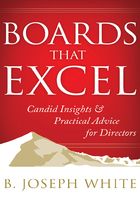
CHAPTER 2 Understand the Role
Stewardship Thinking
How a person approaches board service and thinks about the role of director really matters. Is there a proper metaphor to describe the job?
In my experience, the best directors think of themselves as stewards. They ensure careful and responsible management of the company or organization with which they have been entrusted. They are tough-minded monitors of and thoughtful advisors to those charged with managing. As representatives of owners and stakeholders, they insist on high performance and strive to grow value through prudent risk taking. As stewards, they consider matters not through the lens of self-interest but through the lens of what is best for the organization they oversee.
The metaphor of governance as stewardship yields many insights for a director. It has led me to think carefully about the privileges and responsibilities of board work. It has guided me in handling difficult situations like being a director of a failing company and managing a potential conflict of interest. It has helped me clarify what real director independence is and what director effectiveness requires. It has served as a reminder that in the leadership of organizations, there is a distinct difference between governing and managing.
I have been privileged to work with some wonderful directors. They were diligent in their work and wise in their judgments. They asked penetrating questions. They challenged management with high aspirations and stretch goals. They monitored results and rewarded high performance. They worked through knotty problems. They made tough decisions and took hard action when required. They helped renew the board by leaving when the time was right. They were great stewards.
Regrettably, I have also had experience with lesser directors. Their self-opinions were inflated. They expected to be served more than to serve. Their inattentiveness was embarrassing. Their contributions were of the Johnny and Judy one-note variety. Their disregard for boundaries undermined the chain of command. They folded in the face of conflict and controversy. They were poor stewards.
In this chapter, I share some guiding ideas for great governance—what I call stewardship thinking. Because I have experienced both the best and worst in governance, I know what a difference it makes when directors adopt a stewardship attitude toward their duties. The cornerstone of stewardship thinking in governance is to understand and embrace both the privileges and responsibilities of being a director.